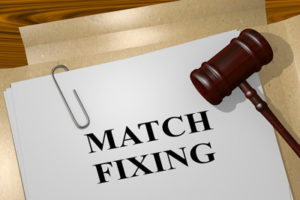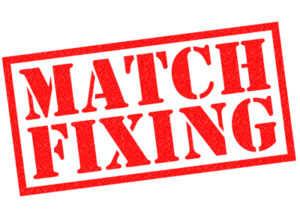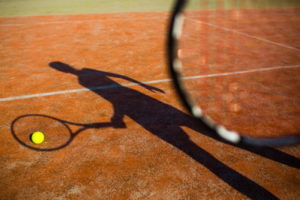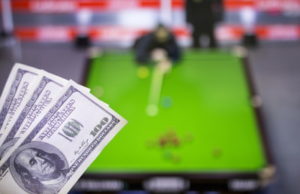 Despite being in the 21st century, you may be surprised to know that match fixing is something that still goes on. It may not be as prevalent as it once was, but there are various circumstances where it has become common knowledge that match fixing has taken place, and this hasn’t been so long ago, either. We thought it would be interesting to find out which sports feature the most instances of match fixing. Furthermore, what are some of the biggest match fixing scandals ever in history?
Despite being in the 21st century, you may be surprised to know that match fixing is something that still goes on. It may not be as prevalent as it once was, but there are various circumstances where it has become common knowledge that match fixing has taken place, and this hasn’t been so long ago, either. We thought it would be interesting to find out which sports feature the most instances of match fixing. Furthermore, what are some of the biggest match fixing scandals ever in history?
And why do people agree to be a part of match fixing? What exactly do they get out of it and why has it risen to such prominence in its own right? Let’s take a look at the different sports with the most match fixing taking place.
What Is Match Fixing?
 In organised sports, match fixing occurs when an event is played to a complete or partially pre-determined result. This violates the rules of the game itself and will frequently break the law at the same time. The most common reason for this taking place is so as to obtain a pay-off from gamblers, although teams may also routinely perform poorly in order to gain a future advantage in their respective sport.
In organised sports, match fixing occurs when an event is played to a complete or partially pre-determined result. This violates the rules of the game itself and will frequently break the law at the same time. The most common reason for this taking place is so as to obtain a pay-off from gamblers, although teams may also routinely perform poorly in order to gain a future advantage in their respective sport.
Of course, if match fixing is taking place due to gambling circumstances, then it requires contacts between gamblers, players, team officials and/or umpires as well. Of course, there are occasions where these contacts can be traced and that leads to persecution in one way or another as a result. On the other hand, losing on purpose for future advantage is something that is very internal to the team, and this is exceptionally hard for anyone to prove.
Other names for match fixing include game fixing, race fixing, race manipulation, sports fixing or hippodroming. According to the company Sportradar, which monitors the integrity of sports events on behalf of sports federations, as many as 1% of the matches that they keep an eye on show suspicious betting patterns. This, it says, could be indicative of match fixing taking place.
The major motivations behind match fixing are gambling and future team advantage. However, it has also been linked with corruption, violence and, in some cases, tax avoidance. It’s not uncommon for the mafia in Eastern Europe to have links to illegal gambling and score fixing. According to some sources, there are people in Russia who have disappeared or lost their lives after acting out against bribes in sports sectors.
Which Sports Are More Likely to See Results Fixed?
 The easier it is, the more likely it will happen. Therefore, match fixing is more likely to occur in single player sports, rather than in team sports. This means that you need to really look at sports like tennis or darts for example, where single participants compete for themselves. This is because it’s easier to convince a single player to participate in match fixing than it is to convince an entire team of players to do so.
The easier it is, the more likely it will happen. Therefore, match fixing is more likely to occur in single player sports, rather than in team sports. This means that you need to really look at sports like tennis or darts for example, where single participants compete for themselves. This is because it’s easier to convince a single player to participate in match fixing than it is to convince an entire team of players to do so.
That’s why options like tennis and snooker etc. are a lot more tainted by match fixing than something like football or basketball. Not that it doesn’t happen in those sports as well, but it is a lot more common in the single player sporting events. Have there been any significant match fixing scandals that have come out in the past? Well, actually, quite a few have been brought to the surface, and people have been found guilty of conspiring in this area, too.
Tennis Scandals
 The issue of match fixing in tennis actually remains as an ongoing problem, with reports from 2019 and 2020 suggesting that it has been taking place. Reports of this occurring in 2007 led to the Tennis Integrity Unit being created in 2008, and in 2011, organisers of the Wimbledon tournament were provided wit a list of people suspected to be involved in match fixing. Only recently, the BBC suggested that tennis is riddled with corruption with regard to match fixing, following Egyptian player Youssef Hossam being found guilty of such.
The issue of match fixing in tennis actually remains as an ongoing problem, with reports from 2019 and 2020 suggesting that it has been taking place. Reports of this occurring in 2007 led to the Tennis Integrity Unit being created in 2008, and in 2011, organisers of the Wimbledon tournament were provided wit a list of people suspected to be involved in match fixing. Only recently, the BBC suggested that tennis is riddled with corruption with regard to match fixing, following Egyptian player Youssef Hossam being found guilty of such.
That’s just one of the occasions where match fixing has been discovered in tennis events. In 2018, Hossam’s older brother Karim was banned for life from professional tennis for being involved in match fixing. That same year, Argentinian tennis player Nicolás Kicker was also banned from the sport for at least three years for conspiring in match fixing. The investigation into the situation by the Tennis Integrity Unit found that Kicker knowingly participated in at least two fixed matches in 2015.
Other circumstances of this occurring in the world of tennis include French player Arnaud Clément claiming that he was offered a bribe to fix a match in 2007, which he reportedly turned down. The following year, Russian tennis player Nikolay Davydenko was cleared of allegations that he fixed a match against Argentinian opponent Martin Vassallo Arguello in Poland, despite the fact that later on, Davydenko was found to have exchanged 82 text messages with the suspected head of an Italian sports betting syndicate.
Brazilian tennis player Diego Matos received his own lifetime ban from tennis in September of 2019, when it was discovered that he also participated in match fixing that year.
Snooker Scandals
 The snooker world has outrightly been plagued by allegations of corruption, and that has been the case ever since it began operating as a professional sport. Even retired professional player and BBC commentator Willie Thorne commented that match fixing has been around in snooker for a long time. He even conceded that some of the results in his own games had been fixed. However, according to some reports, players don’t always enter into match fixing of their own volition. Sometimes, they’re coerced into fixing those results through threats of violence.
The snooker world has outrightly been plagued by allegations of corruption, and that has been the case ever since it began operating as a professional sport. Even retired professional player and BBC commentator Willie Thorne commented that match fixing has been around in snooker for a long time. He even conceded that some of the results in his own games had been fixed. However, according to some reports, players don’t always enter into match fixing of their own volition. Sometimes, they’re coerced into fixing those results through threats of violence.
Thai players have apparently been targeted ruthlessly by cartels. James Wattana once reported receiving a death threat unless he lost one of his upcoming matches. Meanwhile, Thanawat Tirapongpaiboon was the victim of a firebomb attack at his home in Rotherham when the governing body opened an investigation into him and a fellow Thai player Passakorn Suwannawat. Match fixing is heavily difficult to prove in snooker though, with only four arrests being made in the game’s history relating to such. No criminal prosecutions have occurred, though.
The World Professional Billiards and Snooker Association (WPBSA) have proceeded with prosecutions successfully though, with players Stephen Lee, Leo Fernandez, Yu Delu, Cao Yupeng, David John and John Sutton being on the receiving end of such. Four other players have also served bans in relation to match fixing accusations – Quinten Hann, John Higgins, Joe Jogia and Jamie Jones.
In the case of Chinese player Yu Delu, he was found guilty of breaching Rule 2.1.2.1 of the WPBSA Members Rule and Regulations, as it was discovered that he had accepted payment to fix the outcome of a match. Yu admitted to those breaches, and he was sentenced to a twelve-year ban as well as having to pay costs of £20,823.80.
Irish player Leo Fernandez was also found guilty of breaching the same section of the Members Rules. This was said to be in relation to suspicious betting on who would commit the first foul in the first frame of a match that he played against Gary Wilson in 2016. Fernandez admitted his involvement in such after he delivered the first foul shot in the first frame of the match in question. This allowed other people to make money through betting on that outcome. He was banned from the sport for 15 months and ordered to pay £2,000 in costs.
Darts Scandals
 A couple of high-profile scandals in relation to the darts sector include the June 2018 suspension of Filipino player Gilbert Ulang. According to the Darts Regulation Authority, it was found that Ulang deliberately lost to English player Kevin Simm, in the preliminary round of the 2017 PDC World Darts Championship. As a result of that, Ulang was handed a seven-year suspension from participating professionally in the sport.
A couple of high-profile scandals in relation to the darts sector include the June 2018 suspension of Filipino player Gilbert Ulang. According to the Darts Regulation Authority, it was found that Ulang deliberately lost to English player Kevin Simm, in the preliminary round of the 2017 PDC World Darts Championship. As a result of that, Ulang was handed a seven-year suspension from participating professionally in the sport.
Even more recently, Northern Irish player Kyle McKinstry was handed his own suspension from playing darts. In 2020, it was alleged that McKinstry was involved in fixing the results of matches against Dutch player Wessel Nijman and English player David Evans, during the Modus A Night event. Nijman was suspended for fixing a game against Evans in the very same event, too. He admitted to being a part of the setup, while McKinstry admitted to the offence against Evans, but not against Nijman. In the end, it was found that the Northern Irishman was guilty of both charges brought against him.
Football Scandals
 Despite the fact that it’s much easier to fix a single-player match result, that doesn’t mean team games haven’t also been fixed. Some of the biggest scandals in the world have been found going on in the world of association football. In fact, match fixing in football has been described as a “crisis” by former Head of Security of FIFA Chris Eaton. And this is quite the worldwide problem, too.
Despite the fact that it’s much easier to fix a single-player match result, that doesn’t mean team games haven’t also been fixed. Some of the biggest scandals in the world have been found going on in the world of association football. In fact, match fixing in football has been described as a “crisis” by former Head of Security of FIFA Chris Eaton. And this is quite the worldwide problem, too.
Six people were arrested in November 2013 on suspicion of match fixing in English football. Three of those people were current players and one, Delroy Facey, was a former player. Two Singaporean men were later charged in relation to the charges, while two non-league footballers for Whitehawk Football Club were also charged. Three people were jailed in June 2014 as a result of the investigation.
You can go back to the early years of the 1900s as well to see that match fixing has been active in English football for a long time. The 1915 betting scandal saw a game between Liverpool and Manchester United arouse the suspicions of many, owing to the apparent lack of effort utilised by Liverpool players during it. The match ended in a 2-0 result – a win to Manchester United who were threatened with relegation if they lost.
After that match, handbills started to appear that alleged a large amount of money had been bet at odds of 7/1 on a 2-0 win for United. The Football Association investigated the situation, and it was discovered that players from both sides had been involved in the rigging of the game. Liverpool player Jackie Sheldon was found to be the ringleader of the plot, with others in-the-know of it including fellow teammates Bob Pursell, Tom Miller and Thomas Fairfoul, as well as Man U players Arthur Whalley, Sandy Turnbull and Enoch West. Some players did outrightly refuse to take part in the plot, including Fred Pagnam who went on to threaten to wreck the plan and then testified against his teammates during the FA hearing. All seven involved players were banned from playing professionally for life.
What Markets Are Most Likely To Be Fixed?
 While sports betting is often fixed in relation with events being held, not all of the markets available can be fixed in such a way. It’s usually something quite minor that is fixed, so that it doesn’t stand out as much to sports betting operators. The most common route to take with bet fixing is something like losing the third game in a second set or outrightly not scoring any goals in the fourth quarter of an event.
While sports betting is often fixed in relation with events being held, not all of the markets available can be fixed in such a way. It’s usually something quite minor that is fixed, so that it doesn’t stand out as much to sports betting operators. The most common route to take with bet fixing is something like losing the third game in a second set or outrightly not scoring any goals in the fourth quarter of an event.
Obviously, if a team or player were to overthrow the entire match then it could look a lot more suspicious if many people opted to bet on this. Yet, the lesser markets like the ones mentioned aren’t quite as heavily focused on, so this makes them easier to fix the outcomes.
What’s more, these types of match fixing scenarios will usually occur with lesser-known players. They tend to make much less income per year than someone who is the number one seed in tennis or an exceptional football player, for example. The appeal of participating in a match fixing scandal for their share of money (often acquired by partaking in betting on that outcome themselves) is much higher. Someone like tennis star Serena Williams or darts afficionado Peter Wright, don’t really need to partake in such fixes. There’s little that could be gained from doing so by these players.
Can Anything Be Done to Curb Match Fixing?
 Over the years, officials and members of governing bodies have done their best to try and stop match fixing from occurring. With it being so difficult to detect a lot of the time though, is it something that is possible to curb? There’s little doubt that it represents an ongoing threat to the integrity of professional sports. What’s more, it’s an illegal activity.
Over the years, officials and members of governing bodies have done their best to try and stop match fixing from occurring. With it being so difficult to detect a lot of the time though, is it something that is possible to curb? There’s little doubt that it represents an ongoing threat to the integrity of professional sports. What’s more, it’s an illegal activity.
Of course, people are different, so while one may have the virtues of integrity and honesty instilled into them, another may be the complete polar opposite. The latter is obviously much easier to sway and convince to partake in match fixing. Because of this, the activity can occur at any level if the incentive is big enough, although as noted, it’s usually something that happens at the lower levels.
Some have suggested that there needs to be a lot more education on the risks around match fixing, as well as harsher disciplinary action taken against those who are found guilty of engaging in such. Ethics and integrity aren’t something that can be learned overnight by someone who hasn’t been taught them from an early age. More people need to come forward and report situations of being coerced into participating in match fixing. Obviously, preventing match fixing isn’t easy, and the likelihood is that it will always be around in some form or another.
